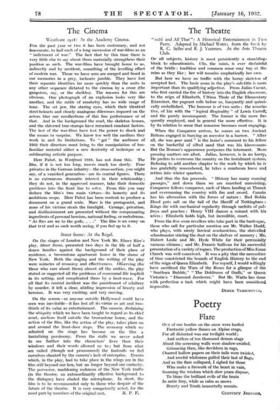The Cinema Wcstfront 1918: At the Academy Cinema.
FOR the past year or two it has been customary, and not inaccurate, to hail each of a long succession of war-films as an " indictment of war." The fact that by this time there is very little else to say about them materially strengthens their position as such. The war-films have brought home to us, indirectly and by accident, something of the levelling effect of modern war. Those we have seen are merged and fused in our memories in a grey, inchoate jumble. They have lost more their separate identities far mo quickly than the units in any other sequence dictated to the cinema by a craze (the gangsters, say, or the sheikhs). The reasons for this are obvious. One photograph of an explosion looks very like another, and the rattle of musketry has no wide range of tone. The set jaw, the staring eyes, which their identical steel-helmets and closely analogous dilemmas imposed on the actors blur our recollections of this fine performance or of that. And in the background the mud, the skeleton houses, and the shivered tree-stumps have remained constant factors. The last of the war-films have lost the power to shock and the means to surprise. We know too well the medium they work in and its limitations. To " get " the audience of 1932 their directors must bring to the manipulation of too- familiar material either a rare dexterity of technique or a sublimating artistic purpose. Herr Pabst, in Westfront 1918, has not done this. The film, if it is not too long, moves much too slowly. Four privates in the German infantry—the cross-section, you might say, of a vanished generation—are its central figures. There is no extraneous dramatic interest in their relationship ; they do not, in the approved manner, take their domestic problems into the front line to solve. From this you may deduce the film's two main virtuesits honesty and its ambitious scope. Herr Pabst has been content to produce a document on a grand scale. Mars is the protagonist, and none of his victims steals the limelight. Carnage, privation, and disillusiomnent are presented without the compensating ingredients of personal heroism, national feeling, or melodrama. " As flies are we to the gods. . . ." The film is an essay on that text and as such worth seeing, if you feel up to it.


































 Previous page
Previous page